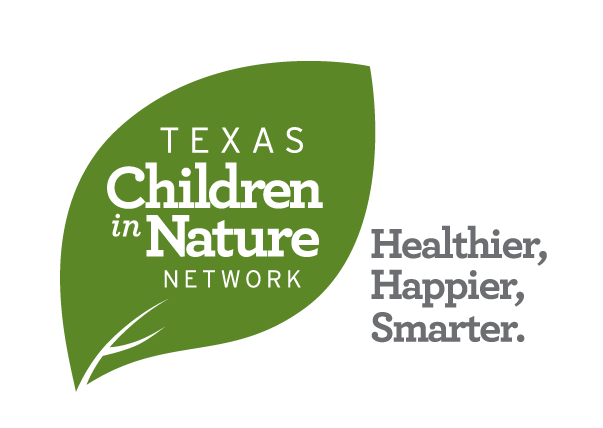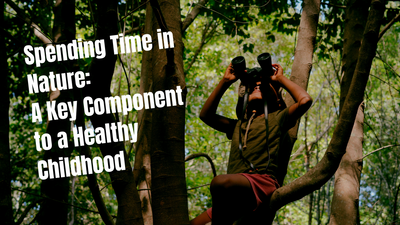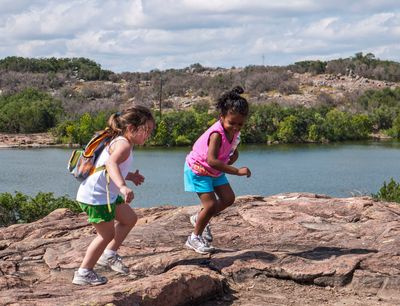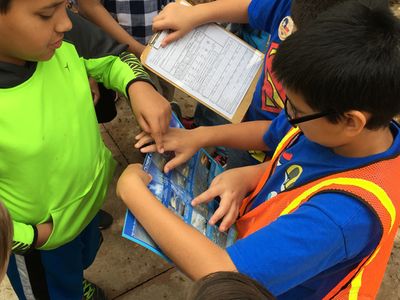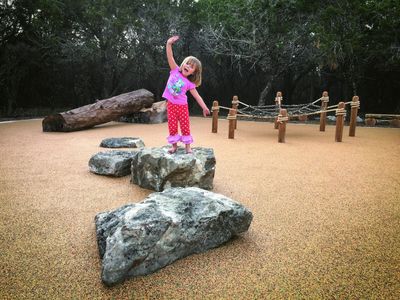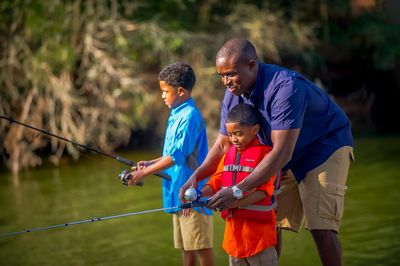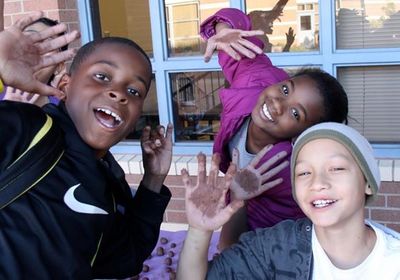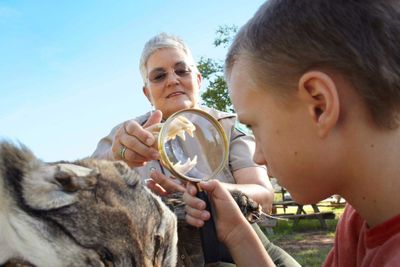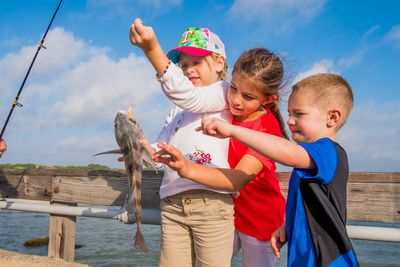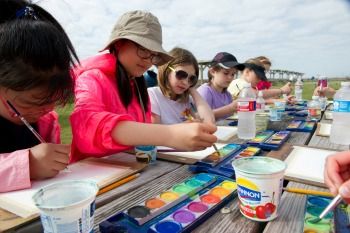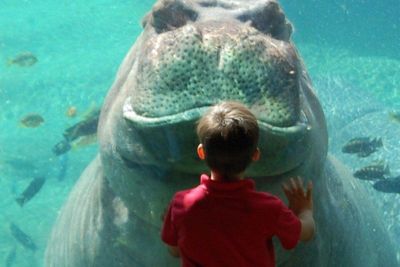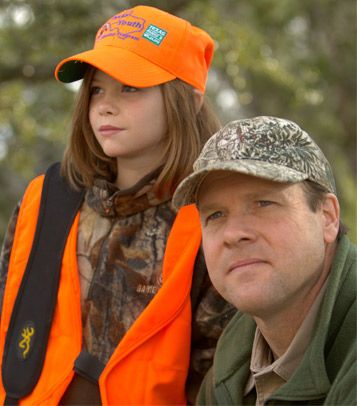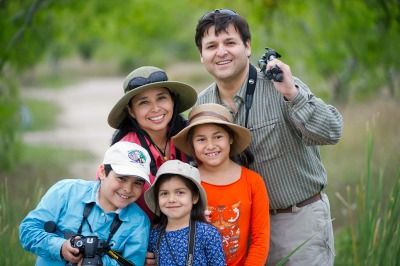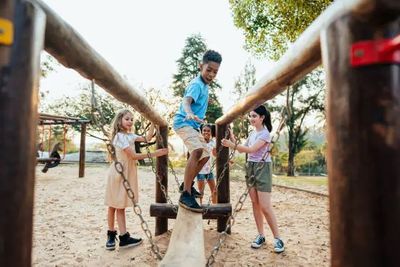Research
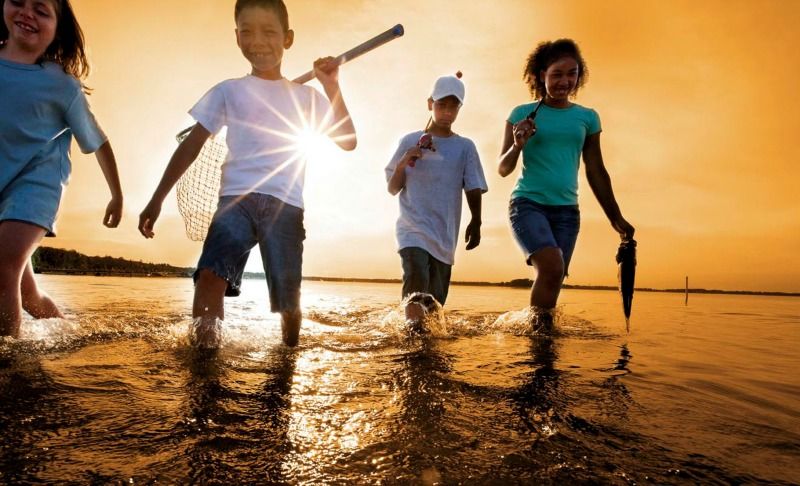
Spending time in nature is great for making memories, but did you know that it is also good for a child’s development? Below you can find some summaries of research that relates to the benefits nature has on a child's development. We also wanted to capture some of the innovations occurring in Texas that increase access to nature or help to achieve the goals of TCiN. Find a robust collection of vetted national and international research studies at the Children and Nature Network.
Presentation on the Health Benefits of Nature
Spending Time in Nature: A Key Component to a Healthy Childhood
On January 25, 2023 Sarah Coles, Executive Director of Texas Children in Nature Network, presented to Grand Rounds at the Texas Department of State Health Services about some of the latest research regarding the health benefits of children spending time in nature.
moreKids Who Learn and Play in Nature...
Are Physically and Mentally Healthier
Research shows what many parents have long known, that children who learn and play in nature are healthier both mentally and physically. Active, unstructured play outdoors helps build a child’s physical strength and also helps children build social and emotional skills such as problem solving and self-esteem.
Children today are spending seven to 11 hours per day sitting with media and only minutes per day playing outdoors. With that sedentary lifestyle we’ve found a rise in childhood obesity, depression, near-sightedness and ADHD. The good news is this is a situation that everyone can improve by taking the kids in their life outside. Families who make a plan to be active in nature are helping their children build skills that will contribute to a healthier life.
Green Space in Childhood is Associated With Lower Risk of Psychiatric Disorders Later in Life
This study investigated whether the presence of green space during childhood is associated with the risk of developing psychiatric disorders later in life. The study also sought to determine if and to what extent the amount of green space exposure during childhood changed the overall effect regarding the risk for later psychiatric disorders. A third aim of the study was to examine if green space presence at a specific age during childhood would have an effect on the risk of psychiatric disorders later in life.
moreDo Better in School
Many of the studies that have looked at the connection between time spent in nature and performance in school. However, one of the most important functions nature plays in a child's development happens before a child enters into formal education. Executive functions such as following directions, working cooperatively and working through problems are all improved when a child spends time outdoors.
Converging Evidence from Diverse Fields Offers Causal Support for Nature’s Impact on Learning, Development and Environmental Stewardship
Do experiences with nature –– from wilderness backpacking to plants in a preschool to a wetland lesson on frogs, promote learning? Until recently, claims outstripped evidence on this question. But the field has matured, not only substantiating previously unwarranted claims but deepening our understanding of the cause-and-effect relationship between nature and learning. Hundreds of studies now bear on this question, and converging evidence strongly suggests that experiences of nature boost academic learning, personal development, and environmental stewardship. This brief integrative review summarizes recent advances and the current state of our understanding. The research on personal development and environmental stewardship is compelling although not quantitative. Report after report –– from independent observers as well as participants themselves –– indicate shifts in perseverance, problem-solving, critical thinking, leadership, teamwork, and resilience. Similarly, over fifty studies point to nature playing a key role in the development of pro-environmental behavior, particularly by fostering an emotional connection to nature. In academic contexts, nature-based instruction outperforms traditional instruction. The evidence here is particularly strong, including experimental evidence; evidence across a wide range of samples and instructional approaches; outcomes such as standardized test scores and graduation rates; and evidence for specific explanatory mechanisms and active ingredients. Nature may promote learning by improving learners’ attention, levels of stress, self-discipline, interest, and enjoyment in learning, and physical activity and fitness. Nature also appears to provide a calmer, quieter, safer context for learning; a warmer, more cooperative context for learning; and a combination of “loose parts” and autonomy that fosters developmentally beneficial forms of play. It is time to take nature seriously as a resource for learning — particularly for students not effectively reached by traditional instruction.
moreHave Higher Self-esteem
Children who have experiences in the outdoors can have higher self-esteem as they learn to work through problems, test assumptions, and challenge themselves in an outdoor setting.
Facilitating Social Emotional Learning in Kindergarten Classrooms
The development of social emotional skills and competencies is a critical part of early childhood development. This study explored how social emotional learning (SEL) is supported by early childhood education teachers in Singapore kindergarten (aka preschool) classrooms. Observations were conducted in six preschool classrooms.
Support for SEL occurred most frequently during outdoor play. This may be due to conflicts among children occurring more frequently during outdoor play than during indoor activities. One form of SEL support occurs when teachers facilitate conflict resolution. Other opportunities for SEL support occurred as children talked and played with peers, as peer interactions can promote relationship management and social awareness. Self-awareness and positive self-concept were supported through opportunities for the children to make choices about activities they wanted to engage in. Such opportunities help them identify their personal likes and dislikes.
moreHave Better Self-discipline
Self-discipline is an important development that many children struggle with. Spending time in nature can help children slow down, consider their options and make direct connections between cause and effects.
Facilitating Social Emotional Learning in Kindergarten Classrooms: Situational Factors and Teachers' Strategies
The development of social emotional skills and competencies is a critical part of early childhood development. This study explored how social emotional learning (SEL) is supported by early childhood education teachers in Singapore kindergarten (aka preschool) classrooms.
Observations were conducted in six preschool classrooms: two classrooms from kindergartens run by the government; two classrooms from not-for-profit kindergartens; and two classrooms from commercial childcare centers. Two research assistants conducted the observations and made video recordings. The length of the recordings ranged from 1 hour 40 minutes to 3 hours 22 minutes. The recordings focused on a variety of indoor and outdoor activities reflecting a typical day in the kindergarten classrooms. Two questions framed the study: (1) How do situational factors (group size, activity, and type of teaching opportunity) influence the frequency of SEL support? (2) What types of strategies do teachers use to support SEL in areas identified in the national curriculum (self-awareness and positive self-concept, self-management, social awareness, relationship management, and responsible decision-making)?
moreAre More Cooperative with Others
Time spent outdoors supports many aspects of children’s health, including their ability to connect and cooperate with others.
Natural Environments Near Schools are Positively Associated With the Socio-emotional and Behavioral Development of Preschool Children
This study investigated associations between preschool children’s socio-emotional and behavioral (SEB) development and natural features near the schools they attended. A primary goal of the study was to understand how “school nature” might contribute to children’s SEB development, beyond what the children gained from “home nature” (natural elements in the home environment).
Researchers obtained Fall (November) and Spring (May) assessment results of preschoolers participating in a publicly funded preschool program in Charlotte, North Carolina for the academic year 2013-2014. Teachers from 50 different schools administered the Devereux Early Childhood Assessment Preschool Program, Second Edition (DECAP2) to the preschoolers in their class. The DECAP2 is a nationally standardized tool designed to assess socio-emotional resources and protective factors in preschool-age children. Areas assessed include initiative, self-regulation, attachment, and behavioral concerns. Aerial photography and Geographic Information Systems provided measures of naturalness or greenness near the children’s homes and schools.
moreAre Good Problem-solvers
Did you know a simple game of hide-and-go-seek can help develop problem-solving skills? Playing a game like this in the outdoors allows children to make observations, look for patterns and listen to discover where their friends and family might be hiding. Nature presents challenges for children; letting kids use their own ideas to solve them. Such challenges can also inspire cooperation — kids may try solving those problems with other kids before engaging their parents, teachers or play leaders.
Time spent outdoors supports many aspects of children’s health.
The Affordances of Natural Play Spaces Can Support the Development of Executive Function Skills in Preschool Children
Playscapes are intentionally designed, dynamic, vegetation-rich, play environments that nurture young children's affinity for nature. We investigated how the affordances of a nature playscape provide opportunities to strengthen children's executive function by identifying examples of goal-directed and focused problem-solving within children's free play in this setting. Through video-based fieldwork, drawing on the extant literature, and application of indicators within existing assessments for executive function in nature preschools, we found that playscapes can be executive function-enhancing environments, as children are likely to set their own goals, problem-solve, self-regulate, focus attention, and demonstrate cognitive flexibility while playing in these settings. Future directions call for follow-up evaluation studies to more robustly substantiate initial findings.
moreFeel More Capable and Confident
Have you ever watched children’s faces light up when they catch their first fish, or reap the first harvest from something they planted? In that moment they have done something so much more than catch a fish — they have been empowered with a skill that will help them be self-reliant.
“I enjoy watching my girls try different methods to catch a fish,” says parent Caleb Harris. “Sometimes what they try doesn’t always work, so I encourage them to try another way. We laugh a lot about some of the silly things we try. Telling their friends how they caught the fish is almost as fun for them as sharing the fact they actually caught one.”
A great way to engage teens and help them master outdoor skills is to have them share their knowledge with younger kids. The thoughtful interaction that can occur is one more step in the journey to self-reliance.
Children who spend time playing in nature are more capable, confident and have higher resilience. These are all abilities that parents want for their children.
Access to Nature Can Promote the Mental Well-being of Children
This systematic review of the literature examined the association between access to green space and the mental well-being of children. Selection criteria included original research focusing on children (0-18 years) published between 2012 and 2017. Twelve articles fitting these criteria were identified. Three additional articles – published prior to 2012 — were included in the review, as they were often cited as important early research on nature-related benefits for children.
moreAre More Creative
Have you ever asked children to tell you what they see, think, smell or feel in a natural setting? Are you amazed at how creative their answers can be? Nature has long been the source of inspiration for ideas, works of art, inventions, literature and music. When kids come up with their own games they are fostering their imaginations.
Creativity is a strong component of critical thinking and important in a child’s development. More importantly, when kids are allowed to explore and use their imagination, it’s really fun for them and the accompanying adults.
Nature-based Risky Play Can Promote Young Children’s Development
This study investigated the effects of an intervention designed to increase opportunities for young children to engage in nature-based risky play. Risky play, which offers children the thrill of uncertainty, is positively associated with physical activity, social health, and exploration and understanding of the world. A decrease in opportunities for risky play is of concern.
The study examined the effects of an intervention to increase opportunities for nature and risky play in the outdoor play environments of two childcare centres using a repeated measures mixed methods design. Assessments of children and their outdoor playspace were conducted before and after changes were made to each center’s outdoor environment. The study used the Seven Cs play space design criteria, adding natural materials to enhance affordances for play. It measured changes in play, social behaviour, psychological wellbeing, and physical activity in 45 children aged 2 to 5.
moreFeel Connected with Nature
When children build a relationship with nature, they tend to be more inclined to care about their natural world as adults. Learning about food webs, water systems, weather and migration patterns of wildlife all helps kids understand the relationship between themselves and the world around them.
Stewardship can be as simple as sharing a love of the outdoors with another person, or something grander like volunteering. At each touch point, kids start to build their own connection and start to care about the things that spark their interest.
Converging Evidence From Diverse Fields Offers Causal Support for Nature’s Impact on Learning, Development and Environmental Stewardship
Do experiences with nature –– from wilderness backpacking to plants in a preschool to a wetland lesson on frogs, promote learning? Until recently, claims outstripped evidence on this question. But the field has matured, not only substantiating previously unwarranted claims but deepening our understanding of the cause-and-effect relationship between nature and learning. Hundreds of studies now bear on this question, and converging evidence strongly suggests that experiences of nature boost academic learning, personal development, and environmental stewardship. This brief integrative review summarizes recent advances and the current state of our understanding. The research on personal development and environmental stewardship is compelling although not quantitative. Report after report –– from independent observers as well as participants themselves –– indicate shifts in perseverance, problem-solving, critical thinking, leadership, teamwork, and resilience. Similarly, over fifty studies point to nature playing a key role in the development of pro-environmental behavior, particularly by fostering an emotional connection to nature. In academic contexts, nature-based instruction outperforms traditional instruction. The evidence here is particularly strong, including experimental evidence; evidence across a wide range of samples and instructional approaches; outcomes such as standardized test scores and graduation rates; and evidence for specific explanatory mechanisms and active ingredients. Nature may promote learning by improving learners’ attention, levels of stress, self-discipline, interest, and enjoyment in learning, and physical activity and fitness. Nature also appears to provide a calmer, quieter, safer context for learning; a warmer, more cooperative context for learning; and a combination of “loose parts” and autonomy that fosters developmentally beneficial forms of play. It is time to take nature seriously as a resource for learning — particularly for students not effectively reached by traditional instruction.
moreAre Tomorrow’s Conservation Leaders
When children are given the chance to connect with nature at a young age, they are more likely to care about it as adults. Below are articles relating to how connecting kids with nature will help develop the next generation of environmental stewards.
Converging Evidence From Diverse Fields Offers Causal Support for Nature’s Impact on Learning, Development and Environmental Stewardship
Do experiences with nature –– from wilderness backpacking to plants in a preschool to a wetland lesson on frogs, promote learning? Until recently, claims outstripped evidence on this question. But the field has matured, not only substantiating previously unwarranted claims but deepening our understanding of the cause-and-effect relationship between nature and learning. Hundreds of studies now bear on this question, and converging evidence strongly suggests that experiences of nature boost academic learning, personal development, and environmental stewardship. This brief integrative review summarizes recent advances and the current state of our understanding. The research on personal development and environmental stewardship is compelling although not quantitative. Report after report –– from independent observers as well as participants themselves –– indicate shifts in perseverance, problem-solving, critical thinking, leadership, teamwork, and resilience. Similarly, over fifty studies point to nature playing a key role in the development of pro-environmental behavior, particularly by fostering an emotional connection to nature. In academic contexts, nature-based instruction outperforms traditional instruction. The evidence here is particularly strong, including experimental evidence; evidence across a wide range of samples and instructional approaches; outcomes such as standardized test scores and graduation rates; and evidence for specific explanatory mechanisms and active ingredients. Nature may promote learning by improving learners’ attention, levels of stress, self-discipline, interest, and enjoyment in learning, and physical activity and fitness. Nature also appears to provide a calmer, quieter, safer context for learning; a warmer, more cooperative context for learning; and a combination of “loose parts” and autonomy that fosters developmentally beneficial forms of play. It is time to take nature seriously as a resource for learning — particularly for students not effectively reached by traditional instruction.
moreLatest Texas Based Research
Find research on the effects of children spending time in nature and topics that affect the work we do based in Texas
moreNature as a Health Initiative in Schools
TCINN has developed a concise health document for the Student Health Advisory Councils (SHAC) throughout Texas to highlight the essential role of free play in supporting students' mental, physical, and academic well-being. Explore this resource to understand the positive impact of free play and its potential to create healthier learning environments.
To view "Nature as a Health Initiative in Schools", click HERE.
more